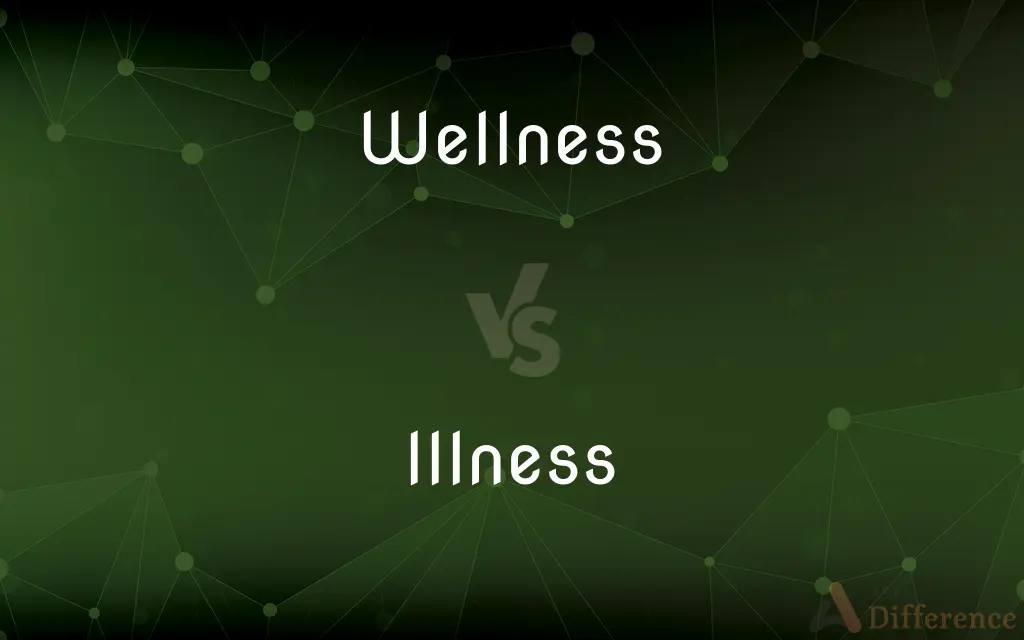Wellness vs. Illness — What's the Difference?
Edited by Tayyaba Rehman — By Urooj Arif — Updated on April 5, 2024
Wellness emphasizes maintaining or improving health through preventive measures, while illness focuses on the presence and treatment of disease.

Difference Between Wellness and Illness
Table of Contents
ADVERTISEMENT
Key Differences
Wellness is an active process of becoming aware of and making choices toward a healthy and fulfilling life. It's a dynamic progression of change and growth that varies among individuals, emphasizing physical, mental, and social well-being. On the other hand, illness is a state or condition of being unwell, either physically or mentally. It is often used to describe the presence of disease, symptoms, or disorders in an individual, focusing on the negative aspects of health.
Wellness involves engaging in behaviors that promote better health outcomes, such as exercise, proper nutrition, and stress management. These proactive measures are designed to prevent illness and enhance quality of life. Conversely, the concept of illness usually triggers a reactive approach, focusing on diagnosis, treatment, and management of diseases or conditions after they have occurred.
A key component of wellness is preventative care, which aims to reduce the risk of becoming ill. This includes regular check-ups, vaccinations, and adopting healthy habits. Illness, in contrast, often necessitates medical intervention to address and manage symptoms, diseases, or injuries, with a focus on healing or managing conditions.
Wellness is holistic, considering the complete person and their lifestyle, and seeks to balance many aspects of personal health, including emotional, environmental, financial, intellectual, occupational, physical, social, and spiritual well-being. Illness typically concentrates on the specific areas where dysfunction or imbalance occurs, without necessarily considering the person’s overall well-being.
The pursuit of wellness is a personal and ongoing journey that encourages individuals to live in a state that is the opposite of illness. It promotes living life fully, with vitality and meaning, despite the challenges that may come. Illness, however, often limits an individual’s capacity to enjoy life fully due to physical, emotional, or cognitive constraints imposed by the condition.
ADVERTISEMENT
Comparison Chart
Focus
Preventive health and improving quality of life
Diagnosis, treatment, and management of diseases
Approach
Proactive (seeking to maintain or enhance health)
Reactive (responding to health problems after they arise)
Scope
Holistic (addresses physical, mental, and social well-being)
Specific (targets particular diseases or conditions)
Measures
Preventative care, healthy lifestyle choices
Medical intervention, medication, therapy
Outcome
Enhanced quality of life, vitality
Management of symptoms, restoration of health
Compare with Definitions
Wellness
A holistic approach to achieving optimal health and vitality.
Incorporating regular exercise into one’s routine is essential for wellness.
Illness
Requires medical intervention to diagnose, treat, and manage.
The treatment plan for her illness includes medication and physical therapy.
Wellness
The state of being in good health, especially as an actively pursued goal.
Meditation and mindfulness are key aspects of maintaining mental wellness.
Illness
A condition of being unwell, either physically or mentally.
Chronic illnesses require ongoing medical treatment and management.
Wellness
The practice of making lifestyle choices that lead to a state of holistic health.
Choosing a balanced diet contributes to overall wellness.
Illness
A disruption of normal functioning, presenting with specific symptoms.
The illness was characterized by fever, fatigue, and muscle aches.
Wellness
An ongoing process of becoming aware of and making choices that lead to a healthy and fulfilling life.
Attending wellness workshops can enlighten individuals on how to improve their well-being.
Illness
The presence of a disease or medical condition.
Early detection of an illness can lead to better outcomes.
Wellness
Involves personal responsibility and proactive actions towards being healthy.
Regular health screenings are part of a proactive wellness plan.
Illness
Often leads to a temporary or permanent limitation in one’s life.
His illness has limited his ability to participate in physical activities.
Wellness
The condition of good physical and mental health, especially when actively maintained by proper diet, exercise, and avoidance of risky behavior.
Illness
A disease or period of sickness affecting the body or mind
I've never missed a day's work through illness
He died after a long illness
Wellness
The quality or state of being in good health.
Illness
Poor health resulting from disease of body or mind; sickness.
Wellness
The process of learning about and engaging in behaviors that are likely to result in optimal health.
Illness
A disease.
Wellness
A healthy state of wellbeing free from disease;
Physicians should be held responsible for the health of their patients
Illness
The quality of being disagreeable or unpleasant.
Illness
Evil; wickedness.
Illness
(countable) An instance of a disease or poor health.
Her grandmother had passed away after a long illness.
Suffer form a severe illness
A mild illness
Illness
(uncountable) A state of bad health or disease.
Many working days this year have been lost through illness.
Illness
The condition of being ill, evil, or bad; badness; unfavorableness.
Illness
Disease; indisposition; malady; disorder of health; sickness; as, a short or a severe illness.
Illness
Wrong moral conduct; wickedness.
Illness
Impairment of normal physiological function affecting part or all of an organism
Common Curiosities
What is wellness?
Wellness is the active pursuit of activities, choices, and lifestyles that lead to a state of holistic health.
How does illness differ from wellness?
Illness refers to being in a state of poor health or having a disease, whereas wellness focuses on maintaining or improving health through preventive measures.
Is wellness only related to physical health?
No, wellness encompasses physical, mental, and social well-being.
How important is medical intervention in managing illness?
Medical intervention is crucial in diagnosing, treating, and managing illnesses to restore health or manage symptoms.
What role does nutrition play in wellness and illness?
Proper nutrition supports wellness by maintaining body function and health, whereas poor nutrition can contribute to the development of illnesses.
What is the impact of illness on quality of life?
Illness can significantly impact one’s quality of life by imposing physical, emotional, and social limitations.
Can someone be ill but still experience wellness?
Yes, individuals can manage their illness in a way that still allows them to pursue aspects of wellness, focusing on what is possible for enhancing their quality of life.
Is it possible to achieve complete wellness?
Complete wellness is an ideal to strive for through balanced living, though challenges and illnesses may affect it.
Can wellness practices prevent illness?
Yes, wellness practices, such as healthy eating, regular physical activity, and stress management, can help prevent certain illnesses.
What are common signs of illness?
Common signs include fatigue, fever, discomfort, pain, and other specific symptoms depending on the condition.
Are mental health conditions considered illnesses?
Yes, mental health conditions are considered illnesses when they significantly impair an individual’s ability to function.
Can wellness change over time?
Yes, an individual’s level of wellness can change due to various factors, including age, environment, and lifestyle choices.
How do stress and wellness relate to each other?
Managing stress is a key component of wellness, as chronic stress can lead to physical and mental health problems.
How does exercise contribute to wellness?
Regular exercise improves physical and mental health, supports bodily functions, and can prevent various illnesses.
What is a holistic approach to wellness?
A holistic approach considers the whole person, including their physical, mental, and social needs, in the pursuit of optimal health.
Share Your Discovery

Previous Comparison
Skim vs. Scan
Next Comparison
Sign vs. OmenAuthor Spotlight
Written by
Urooj ArifUrooj is a skilled content writer at Ask Difference, known for her exceptional ability to simplify complex topics into engaging and informative content. With a passion for research and a flair for clear, concise writing, she consistently delivers articles that resonate with our diverse audience.
Edited by
Tayyaba RehmanTayyaba Rehman is a distinguished writer, currently serving as a primary contributor to askdifference.com. As a researcher in semantics and etymology, Tayyaba's passion for the complexity of languages and their distinctions has found a perfect home on the platform. Tayyaba delves into the intricacies of language, distinguishing between commonly confused words and phrases, thereby providing clarity for readers worldwide.













































